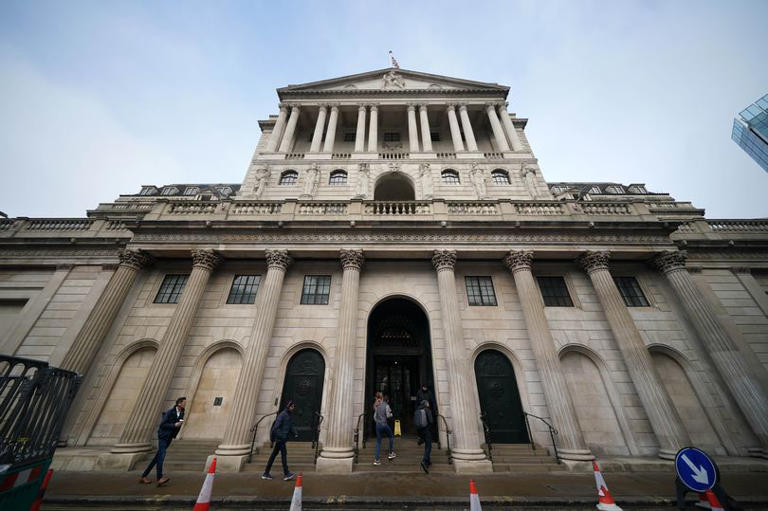Inflation Trends
Inflation trends around the globe are impacting economic decisions. Discover how recent data from the US could influence interest rates in the UK and beyond.

© Provided by This Is Money
Inflation Trends: A Global Economic Indicator
Inflation trends play a crucial role in shaping economic policies and decisions worldwide. Recent data from the United States suggests a moderation in inflation, signaling potential changes in interest rates. Let’s delve into how these trends are influencing financial landscapes and what it means for various markets.
Implications for Interest Rates
The recent decline in inflation rates in the United States has sparked hope for a cut in interest rates by the Bank of England. This move could impact homeowners, businesses, and financial markets. However, it’s essential to understand the broader implications of such a decision and its ripple effects across economies.
Global Economic Interconnectivity
While the UK and the eurozone may not be directly affected by US inflation figures, the interconnected nature of global markets means that sentiment in Washington and on Wall Street cannot be ignored. Changes in US monetary policy can have far-reaching consequences, influencing currency exchange rates and import costs for countries like the UK.
Market Sentiment and Investor Confidence
Market sentiment and investor confidence are heavily influenced by inflation trends and monetary policy decisions. The recent moderation in US inflation has led to speculation about potential interest rate cuts by the Federal Reserve. This has impacted currency markets and investor behavior, creating both opportunities and challenges for businesses and individuals alike.
Energy Prices and Supply-Side Inflation
Governor Andrew Bailey of the Bank of England has highlighted the differences in inflation drivers between the US and the UK. While US inflation is driven by strong consumer demand and a vibrant job market, UK inflation is rooted in supply-side factors, particularly energy prices. Understanding these nuances is crucial for making informed policy decisions.
Challenges of Monetary Policy
Monetary policy is not an exact science, and central banks often face challenges in predicting and responding to economic trends. The Bank of England has been criticized for keeping interest rates too low for too long, leading to unexpected inflationary pressures. As former Federal Reserve chairman Ben Bernanke noted, unforeseen factors like energy subsidies can skew inflation forecasts.
Balancing Act for Central Banks
The Monetary Policy Committee (MPC) faces the challenge of determining the appropriate timing and magnitude of interest rate adjustments. Failing to act swiftly in response to changing economic conditions can have detrimental effects on consumer confidence and overall economic stability.

The Role of Financial Markets
Financial markets play a crucial role in transmitting monetary policy decisions to the broader economy. Changes in interest rates can impact borrowing costs, investment decisions, and asset prices. Therefore, market participants closely monitor central bank announcements and economic indicators to gauge future policy directions.
London Stock Exchange Group: Beyond Equities
The London Stock Exchange Group (LSEG) is not just a traditional equity market; it is a multifaceted financial institution with diverse operations. From data services to derivatives clearing and trading platforms, LSEG plays a pivotal role in global financial markets. Its recent stake sale at a premium reflects investor confidence in London’s market liquidity.
Diversification and Resilience
Diversification is key to the resilience of financial institutions like the London Stock Exchange Group. By offering a wide range of services and products, LSEG can adapt to changing market conditions and mitigate risks. This ability to evolve and innovate is essential for maintaining competitiveness in the ever-evolving financial landscape.
Anglo American’s Strategic Moves
Anglo American’s strategic moves amidst takeover attempts highlight the dynamics of corporate decision-making in the face of market pressures. By considering divestment of certain assets, Anglo American aims to strengthen its position and unlock value for shareholders. The sale of valuable steel-coking coal operations underscores the company’s commitment to strategic growth.
Looking Ahead: Economic Uncertainties
As we navigate through uncertain economic times, it’s essential to stay informed and adaptable. Inflation trends, monetary policy decisions, and market dynamics will continue to shape the global economic landscape. By understanding these factors and their implications, businesses and individuals can make informed decisions to navigate challenges and seize opportunities.
Conclusion
Inflation trends are a critical indicator of economic health and stability. Recent data from the United States suggests a moderation in inflation, which could influence interest rate decisions by central banks like the Bank of England. Understanding the interconnected nature of global markets and the nuances of inflation drivers is essential for making informed economic decisions. As we navigate through economic uncertainties, staying informed and adaptable is key to seizing opportunities and mitigating risks in the ever-evolving financial landscape.
ALSO READ:
“Santander Switching Offer: Get £175 with a Simple Switch!”




